Coronavirus: Behind the scenes on the intensive care front line
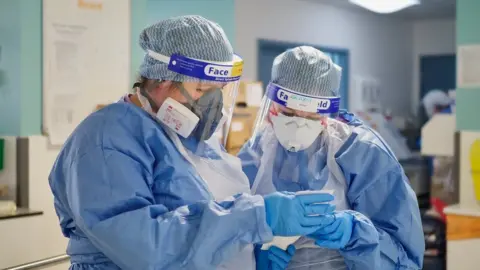 Nick Mason
Nick Mason"Robert, your wife is on the phone," the intensive care nurse tells her coronavirus patient.
"Hi Rob, hiya darling," Ceryl says on the other end of the video call, seeing her husband for the first time in weeks since he was put on a ventilator.
Rob is lying on a hospital bed, connected to medical equipment.
"He looks peaceful," Ceryl says to Laura, the nurse, before speaking to her husband again: "Hi Rob, I love you. We love you."
Rob and Ceryl's conversation is one of the stories from the coronavirus front line captured by intensive care workers at Newport's Royal Gwent Hospital.
The filming, done entirely by the staff, will be shown in Critical: Coronavirus in Intensive Care, a new BBC Wales programme.
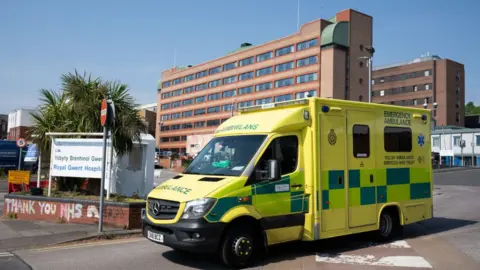 Getty Images
Getty Images"This is all very normal," reassures Laura, as she explains to Ceryl the wires and tubes attached to her husband that have helped keep him alive.
Ceryl has not been allowed to see Rob face to face, with visiting banned in hospitals in an effort to stop the virus spreading.
'You'll get better every day now'
It takes all of Rob's energy for him to respond to a request to poke out his tongue.
His lips move slightly, a small sign of progress.
"Come on, I know you're tired," Ceryl responds. "You'll get better every day now.
"I do love you so much, I miss you so much. You love me too - I know that, you always tell me how much you love me."
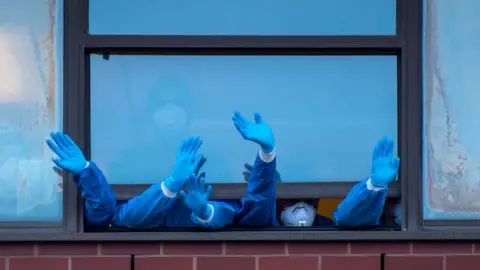 Getty Images
Getty ImagesSince filming, Rob has left intensive care and is back on a regular ward.
He is one of the more than 2,800 Covid-19 patients in Wales that have needed hospital help and survived.
Allow X content?

But more than 31,500 people in the UK - 1,116 of them in Wales - have died.
Rob lives in the one of the areas worst hit by Covid-19 in the UK - where doctors in south east Wales have worked unprecedented hours and performed previously unimaginable tasks.
A father's final moments
The impersonal nature of doctors telling families the worst possible news about their loved one by telephone made one senior doctor search for an answer.
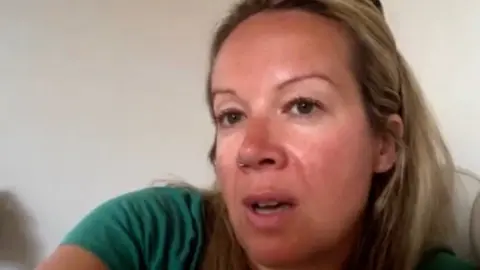
"What on earth can I do to make this vaguely human?" critical care consultant Laura McClelland said.
"So I spoke to the daughter of this person and I said: 'I don't whether this is going to sound like the most barbaric thing or whether is something you would entertain'.
"But we can possibly video call the end of life - and she actually said 'Oh God, that would be great. At least I would feel I could be there in some way'.
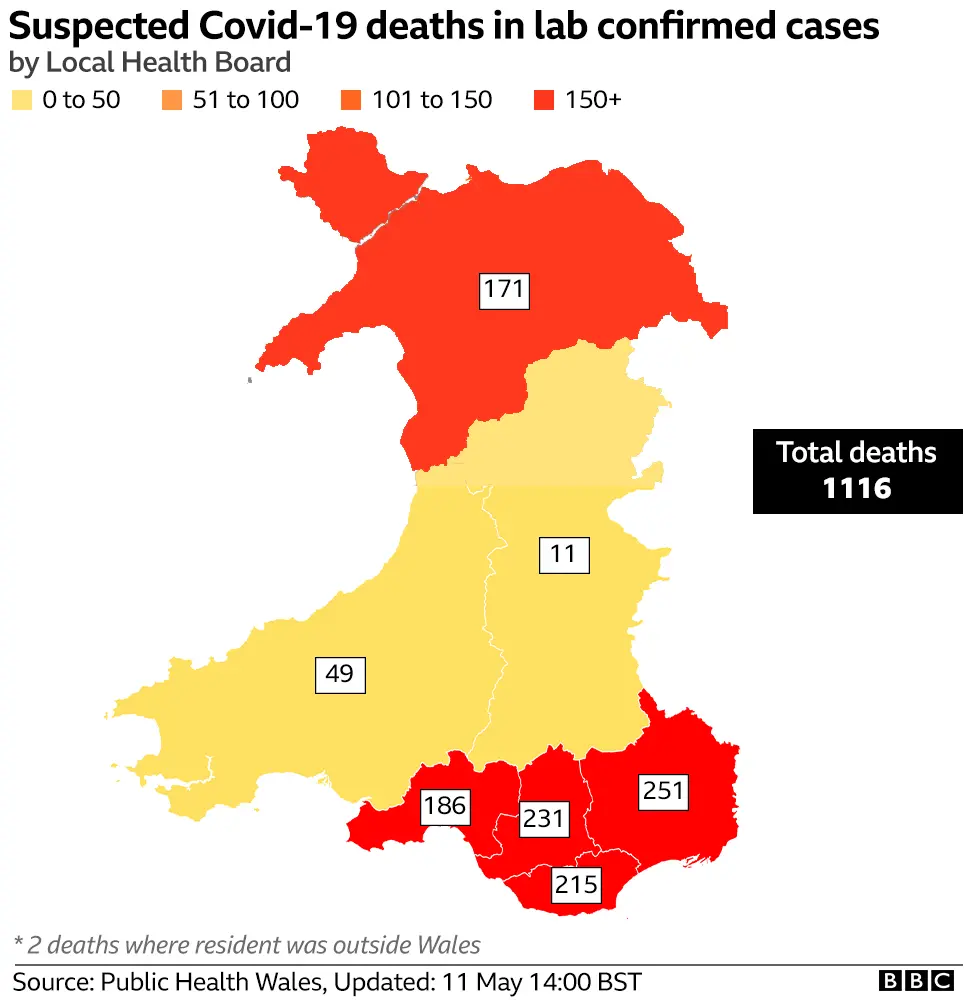
"So we prepared everything and we made contact via video conferencing and she saw the face of her parent - and she said what she wanted to say.
"What a fantastic parent they had been and all the things she wanted to say to him but wouldn't be in a position to."
'He died with her talking to him'
Dr McClelland said when the daughter had "said what she wanted to say" they began turning off the various instruments keeping her father alive.
"We sat in a group and she watched her dad's face throughout the whole process and he died with her talking to him," she said.
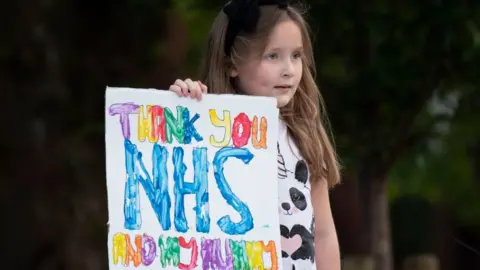 Getty Images
Getty Images"At least that person will now know that her loved one was looked after by people that cared and she knew our names.
"And she will picture the fact that he was surrounded by people who did really care.
"It took me about three days to get over what I had been a part of - and it's not a normal thing."
Writing your will in work
"We feel like we've come out into war" admits one worker, while another concedes: "We have tears at the beginning of shifts and we have tears at the end of shifts."
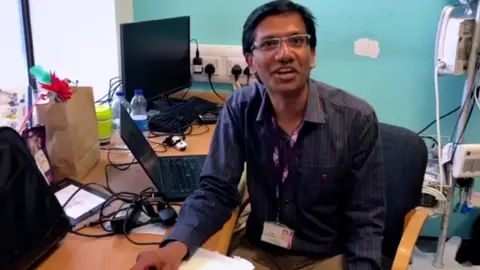
Critical care consultant Babu Muthuswamy is even making a will during his break, as both he and his wife are on the front line.
"I know in these tough times, you just don't know who is going to be dying," he said, only too aware more than 100 front-line workers in the UK have died with Covid-19.
Despite the risks, the staff have been part of a transformation at the hospital to prepare it for coronavirus.
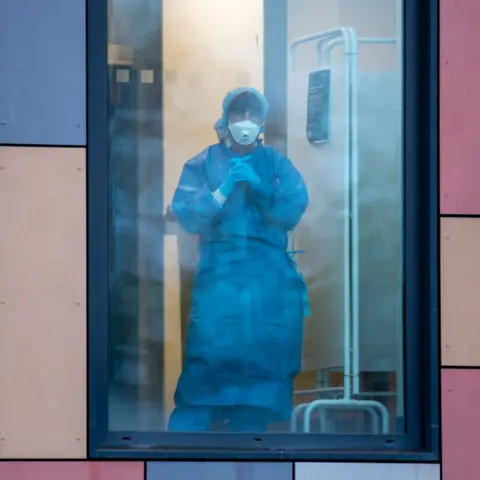 Getty Images
Getty ImagesAt one stage, the Aneurin Bevan University Health Board - which covers the old county of Gwent in south-east Wales - was dealing with the highest number of cases per head of population in the UK outside London.
"We are disproportionately affected," said intensive care consultant David Hepburn.
The Royal Gwent Hospital's intensive care unit has grown to become one of the UK's biggest within the space of a few weeks, growing its capacity by almost nine times.
"The volume was astonishing," Dr Hepburn added. "But cases are plateauing and we're now on top of things."
Critical: Coronavirus in Intensive Care will be on BBC One Wales at 21:00 BST on Monday and on the BBC iPlayer


- A SIMPLE GUIDE: How do I protect myself?
- AVOIDING CONTACT: The rules on self-isolation and exercise
- HOPE AND LOSS: Your coronavirus stories
- LOOK-UP TOOL: Check cases in your area
- FACE MASKS: Should I be wearing one?

